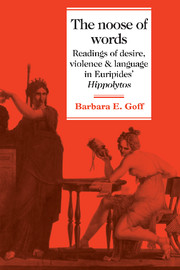Summary
Speech and silence, in the Hippolytos, articulate not only the play's structuring polarities but also its representations of desire and violence. Desire and speech, both structured by difference and absence, are mutually generative and selfperpetuating; the play can be read as a series of attempts to silence a desire that continually erupts into ever more destructive speech. The exchanges of language that constitute the play become increasingly violent and material in their effects. Violence is also represented in terms drawn from a discourse of desire, so that Hippolytos' downfall can be seen as a feminisation, figured as rape from the sacred meadow and expulsion from the paternal home, which allies him to Phaidra. This levelling effect of violence, which eradicates differences between the characters, ensures that the violence is unstoppable and that all the characters are caught up in its network of imitation. The instability of desire and violence is reproduced by the play's models of authoritative language. The gods, myth, and writing each offer to provide transcendent authority and stability of meaning, but constantly fail to do so. In my study of the ending I shall be reworking the figures of speech and silence, desire, violence, and language, examining whether the ending offers any resolution of the problems that the play has posed or whether those problems continue to trouble the play's idea of itself. I hope to show that there are more ambiguities and tensions in this ending than are usually acknowledged in the critical literature, and that drawing them out allows a better appreciation of what is at stake in the ending.
- Type
- Chapter
- Information
- The Noose of WordsReadings of Desire, Violence and Language in Euripides' Hippolytos, pp. 105 - 129Publisher: Cambridge University PressPrint publication year: 1990



